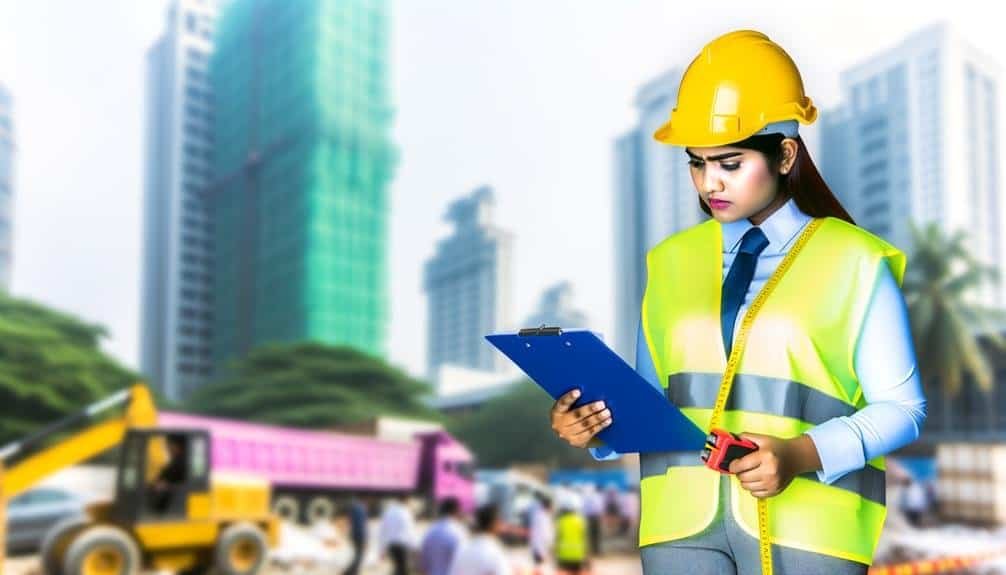What Is a Code Compliance Officer?
Did you know that there has been a significant increase in the demand for code compliance officers over the past decade? With the rise in construction projects and community development, the need for professionals who ensure building safety and adherence to local regulations has become crucial.
But what exactly does a code compliance officer do? What are their responsibilities and duties? In this discussion, we will explore the role of a code compliance officer, the importance of enforcing local ordinances, and how they contribute to maintaining community integrity and safety.
So, let's dive in and uncover the world of code compliance officers and their vital role in our communities.
Key Takeaways
- A code compliance officer is responsible for ensuring that regulations and standards are upheld in regards to building codes, zoning laws, and environmental regulations.
- Their role includes conducting inspections, enforcing code regulations through warnings, citations, or fines, and collaborating with property owners to rectify violations.
- They play a crucial role in maintaining building safety and regulations by identifying hazards or violations, working with property owners to address non-compliance issues, and taking legal action if necessary.
- Code compliance officers also enforce local ordinances, monitor compliance with regulations, and collaborate with other departments to address complex cases, all with the goal of maintaining community integrity and safety.
The Role of a Code Compliance Officer
The role of a code compliance officer is to ensure that regulations and standards are upheld in order to maintain safety and compliance within a given jurisdiction.
As a code compliance officer, you'll be responsible for inspecting properties and enforcing local, state, and federal codes and ordinances. This requires a strong understanding of building codes, zoning laws, and environmental regulations.
Job requirements for code compliance officers typically include a high school diploma or equivalent, along with specialized training in code enforcement or a related field. In some cases, a college degree in a relevant discipline may be preferred.
Necessary qualifications for this role include excellent communication skills, attention to detail, and the ability to interpret and apply complex regulations. Additionally, strong problem-solving and decision-making abilities are crucial in order to effectively address code violations and ensure compliance within the community.
Responsibilities and Duties
To effectively fulfill your role as a code compliance officer, you'll need to understand the responsibilities and duties associated with ensuring regulatory adherence and maintaining safety within your jurisdiction. Here are some key areas that you'll be responsible for:
- Conducting building inspections: As a code compliance officer, you'll be responsible for inspecting buildings and structures to ensure compliance with local, state, and federal codes. This includes checking for violations such as faulty wiring, inadequate ventilation, or unsafe building materials.
- Enforcing code regulations: It will be your duty to enforce code regulations by issuing warnings, citations, or fines to property owners who fail to comply with the established codes. This may involve conducting follow-up inspections and working with property owners to rectify any violations.
- Providing education and outreach: Another important aspect of your role will be to educate the public about code requirements and promote compliance. This may involve conducting workshops, seminars, or distributing informational materials to increase awareness and understanding of code regulations.
Ensuring Building Safety and Regulations
Ensuring building safety and regulations involves conducting thorough inspections and enforcing compliance with local, state, and federal codes.
As a code compliance officer, your primary responsibility is to ensure that buildings meet the necessary safety standards and adhere to legal requirements. This requires conducting regular building inspections to identify any potential hazards or violations.
During inspections, you'll closely examine various aspects of a building, such as its structural integrity, electrical systems, plumbing, and fire safety measures. Your goal is to identify any non-compliance issues and work with property owners to rectify them.
In addition to inspections, you'll also be responsible for enforcing legal compliance by issuing citations, fines, or even taking legal action if necessary. Your attention to detail and commitment to upholding building safety and regulations play a crucial role in protecting the community and ensuring the well-being of its occupants.
Enforcing Local Ordinances
Enforcing local ordinances requires vigilant monitoring and proactive intervention to ensure compliance with regulations. As a code compliance officer, your primary responsibility is to enforce zoning regulations and property maintenance standards within your jurisdiction.
Here are three key tasks you'll undertake in this role:
- Conduct regular inspections of residential and commercial properties to identify any violations of local ordinances.
- Issue warnings, citations, or fines to property owners who fail to comply with zoning regulations or property maintenance requirements.
- Collaborate with other departments, such as planning and development, to address complex cases that require a coordinated approach.
Maintaining Community Integrity and Safety
Maintaining the integrity and safety of the community requires vigilant monitoring and proactive intervention from code compliance officers. These officers play a crucial role in upholding community standards and ensuring that properties are well-maintained.
| Community Standards | Property Maintenance | Proactive Intervention |
|---|---|---|
| Code compliance officers enforce community standards by conducting regular inspections to identify violations. They ensure that properties adhere to zoning regulations, building codes, and other local ordinances. By doing so, they help maintain the overall appearance and functionality of the community. | Property maintenance is another important aspect of a code compliance officer's role. They address issues related to overgrown yards, abandoned buildings, and other property-related concerns. By addressing these issues promptly, code compliance officers contribute to the overall safety and well-being of the community. | Proactive intervention is a key responsibility of code compliance officers. They educate community members about the importance of maintaining property standards and provide guidance on how to rectify any violations. This proactive approach helps prevent potential issues and fosters a sense of pride and responsibility within the community. |
The dedication and diligence of code compliance officers are essential for maintaining community integrity and safety. Their role goes beyond enforcement; it involves creating a community where everyone feels proud to call home.
Conclusion
Congratulations! Now that you know what a code compliance officer does, you can sleep soundly knowing that someone is diligently ensuring your building's safety and enforcing local ordinances.
It's ironic, isn't it? The very person who may seem like a stickler for rules is actually the one keeping your community intact and secure.
So next time you spot a code compliance officer, give them a nod of appreciation. They're the unsung heroes of community integrity and safety.






